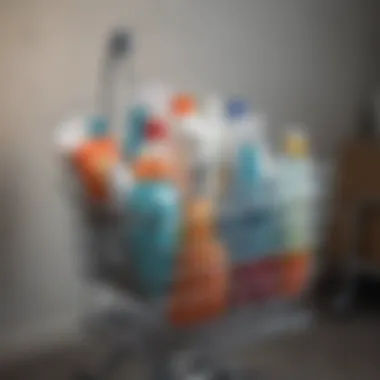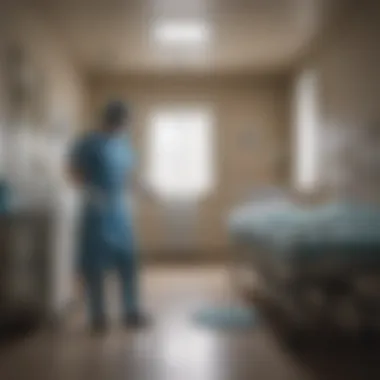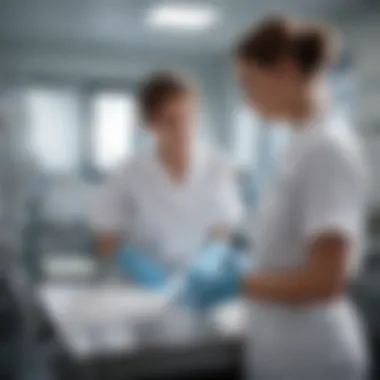Unveiling the Intricacies of Hospital Maid Positions: Responsibilities, Challenges, and Rewards


Market Insights
When examining hospital maid jobs within the healthcare industry, it is crucial to consider the current trends and developments in this sector. The demand for cleanliness and infection control has heightened significantly in recent times, leading to an increased focus on the role of hospital maids. Market analysis indicates a growing need for skilled professionals in this field, with predictions suggesting a continued rise in job opportunities for individuals interested in pursuing a career as a hospital maid.
Economy Insights
Exploring the economic indicators and metrics related to hospital maid jobs provides valuable insights into the financial aspects of this profession. Government policies regarding healthcare cleanliness standards and impacts on staffing requirements contribute to the economic landscape for hospital maids. Stay updated on global economic news to understand how external factors may influence job stability and career advancement in this field.
Investment Strategies
When considering career paths such as hospital maid jobs, it is essential to focus on portfolio diversification. Enhancing skills related to sanitation practices and infection control can act as risk management techniques in a healthcare environment. Evaluate your investment in training and professional development as critical criteria for long-term success in the hospital maid role.
Personal Finance Tips
For individuals pursuing hospital maid jobs, implementing budgeting and saving strategies can aid in financial stability. Retirement planning guidance tailored to the healthcare industry offers insights into securing your future post-employment. Learn effective debt management tips to navigate potential financial challenges and ensure a secure financial foundation.
Case Studies and Success Stories
Real-life case studies and success stories provide practical examples of thriving in hospital maid jobs. Explore successful investment stories of individuals who have excelled in their sanitation careers, showcasing personal finance transformation journeys within the healthcare sector.
Introduction
Hospital maid jobs play a vital role in ensuring the cleanliness and hygiene of healthcare facilities. These professionals are responsible for maintaining a sanitized environment to promote patient well-being and safety. The Introduction sets the stage for understanding the significance of hospital maid roles in healthcare settings. It highlights the essential duties, challenges, and rewards associated with this critical position. Readers will gain insight into the meticulous work of hospital maids and their impact on the overall quality of patient care.
Defining the Role of Hospital Maid
Hospital maids execute a range of responsibilities vital for the smooth operation of healthcare facilities. Their primary focus is on ensuring cleanliness and hygiene in patient rooms, common areas, and other spaces within the hospital premises. By disinfecting surfaces, changing linens, and maintaining the cleanliness of waiting rooms, hospital maids contribute significantly to infection control and patient comfort. Their scope of work includes adhering to strict protocols to prevent the spread of infections and maintain a safe environment for patients, visitors, and staff.


Responsibilities and Scope
The responsibilities and scope of hospital maids encompass various tasks essential for upholding cleanliness standards. From disinfecting high-touch surfaces to ensuring fresh linens for patients, their meticulous attention to detail is crucial for preventing the transmission of infections within healthcare settings. This section elaborates on the key characteristics of their responsibilities, emphasizing the importance of these tasks in creating a hygienic environment conducive to patient recovery and well-being.
Importance of Hospital Cleanliness
Maintaining high levels of cleanliness in hospitals is paramount for safeguarding patient health and well-being. The cleanliness of hospital facilities directly impacts patient recovery rates and reduces the risk of healthcare-associated infections. Hospital maids play a pivotal role in upholding these standards through their diligent cleaning practices and adherence to strict hygiene protocols.
Impact on Patient Health
The cleanliness of hospital environments has a direct correlation with patient health outcomes. A sterile and hygienic setting not only promotes faster recovery but also reduces the likelihood of complications and secondary infections. Hospital maids' meticulous cleaning initiatives are essential for creating a safe space that supports the healing process and boosts overall patient satisfaction.
Compliance with Regulations
Adherence to regulatory standards is non-negotiable in healthcare facilities. Hospital cleanliness regulations are in place to ensure the well-being of patients and staff members by mitigating infection risks. Hospital maids must stay abreast of these regulations and implement best practices to maintain a sterile environment that complies with industry standards and guidelines.
Key Responsibilities
As we delve into the intricate world of hospital maid jobs, it becomes evident that the key responsibilities undertaken by these professionals play a pivotal role in maintaining the cleanliness and hygiene standards within healthcare facilities. The primary focus lies on ensuring that patient rooms are sanitized to prevent the spread of infections and diseases. By meticulously disinfecting surfaces and changing linens regularly, hospital maids contribute significantly to safeguarding the well-being of patients and staff members. These responsibilities carry immense importance as they directly impact the overall health and safety of individuals accessing healthcare services.
Sanitizing Patient Rooms
Disinfecting Surfaces
Within the realm of hospital maid duties, the task of disinfecting surfaces stands out as a crucial aspect essential for creating a germ-free environment. By utilizing specialized cleaning agents and techniques, these professionals eradicate harmful pathogens that could jeopardize the health of patients. The key characteristic of disinfecting surfaces lies in its ability to target and eliminate a wide range of bacteria and viruses effectively. This method is widely recognized for its efficacy in reducing healthcare-associated infections, making it a preferred choice for hospitals aiming to maintain high levels of cleanliness. Despite its efficacy, frequent use of disinfectants may pose challenges such as respiratory irritations for some individuals, requiring careful handling and ventilation to mitigate these potential disadvantages.
Changing Linens
Another fundamental task within the scope of hospital maid responsibilities is the regular changing of linens in patient rooms. This practice not only enhances the comfort of patients but also plays a critical role in minimizing the spread of infections. The key characteristic of changing linens is its direct impact on preventing cross-contamination and maintaining a hygienic environment for patients. This routine is a popular choice among healthcare facilities due to its role in enhancing the overall patient experience and promoting recovery. However, one must consider the significant time and effort required to change linens frequently, which can pose challenges in busy hospital settings. Despite this drawback, the advantages of maintaining fresh and clean linens far outweigh the associated difficulties.


Maintaining Common Areas
Cleaning Waiting Rooms
The meticulous cleaning of waiting rooms stands as a fundamental aspect of hospital maid responsibilities, ensuring that communal spaces remain sanitary and welcoming. By focusing on high-touch surfaces and thorough cleaning procedures, these professionals create a safe environment for patients and visitors. The key characteristic of cleaning waiting rooms lies in its ability to create a positive first impression and instill confidence in individuals accessing healthcare services. This practice is a beneficial choice for hospitals seeking to prioritize cleanliness and customer satisfaction. However, the unique feature of cleaning waiting rooms lies in the constant foot traffic and potential exposure to various contaminants, which requires continuous vigilance and proactive cleaning measures to maintain optimal hygiene levels.
Disposing of Waste Properly
Proper disposal of waste materials is a crucial task undertaken by hospital maids to uphold infection control standards and promote a hygienic environment. By adhering to strict waste management protocols and regulations, these professionals minimize the risk of contaminations and effectively manage healthcare-related waste. The key characteristic of disposing of waste properly is its role in preventing environmental hazards and ensuring compliance with sanitation guidelines. This method is a popular choice for hospitals looking to maintain a clean and safe working environment. Despite its benefits, the unique feature of waste disposal lies in the potential exposure to biohazards and sharp objects, highlighting the importance of proper training and protective measures for hospital maids involved in waste management.
Challenges Faced by Hospital Maids
In the domain of hospital maid jobs, encountering challenges is an inevitable part of everyday work. These challenges not only test the competence of hospital maids but also play a significant role in determining the smooth operation of healthcare facilities. One of the most pressing challenges faced by hospital maids is the constraint of time. Time is a precious commodity in healthcare settings where every minute counts towards maintaining cleanliness and ensuring the well-being of patients. The challenge of time constraints encompasses juggling multiple tasks within tight schedules, creating a demanding environment for hospital maids.
Time Constraints
Balancing Multiple Tasks
Balancing multiple tasks is like walking a tightrope for hospital maids. It requires exceptional organizational skills, sharp attention to detail, and the ability to prioritize effectively. Hospitals are bustling environments with no room for errors, making the skill of balancing multiple tasks crucial for the successful completion of duties. Hospital maids must navigate between sanitizing patient rooms, maintaining common areas, and handling various cleaning responsibilities with finesse and efficiency. The key characteristic of balancing multiple tasks lies in the art of multitasking without compromising quality or safety measures. It is a skill that not only defines the competency of hospital maids but also ensures the seamless operation of healthcare facilities. While balancing multiple tasks offers the advantage of productivity and thoroughness, it also poses the challenge of mental and physical endurance in demanding work conditions.
Health and Safety Risks
Another critical challenge faced by hospital maids is the exposure to health and safety risks, particularly concerning contaminants present in medical environments. Hospital settings are prone to harboring infectious agents and hazardous materials, putting maids at risk of exposure to pathogens and harmful substances. The health and safety risks associated with cleaning hospital spaces require hospital maids to adhere to stringent protocols and safety guidelines to mitigate the potential hazards. Exposure to contaminants not only jeopardizes the well-being of hospital maids but also underscores the importance of proper training and protective measures in safeguarding their health.
Exposure to Contaminants
Exposure to contaminants entails the direct contact with biological fluids, infectious waste, and environmental toxins while performing cleaning duties. Hospital maids face the unique challenge of handling biohazardous materials and disinfectants regularly, increasing their vulnerability to health risks. The key characteristic of exposure to contaminants underscores the critical need for hospital maids to exercise caution, use personal protective equipment, and follow established protocols to minimize exposure. While exposure to contaminants is a common occupational hazard in hospital maid roles, conscientious adherence to safety practices can mitigate the risks and ensure a safe working environment. The advantages of proactive safety measures include protecting the health of hospital maids and upholding the hygiene standards essential for patient care.


This focused exploration of the challenges faced by hospital maids sheds light on the demanding nature of their work and underscores the importance of addressing time constraints and health and safety risks in healthcare cleaning roles.
Rewards and Opportunities
In the realm of hospital maid jobs, the segment dedicated to Rewards and Opportunities serves as a beacon for aspirants looking to understand the gratifying aspects of this vocation. Delving into the myriad advantages, considerations, and elements that define the Rewards and Opportunities within this niche, one uncovers a tapestry of pivotal factors. Firstly, job satisfaction emerges as a cornerstone element underpinning the attractiveness of this role, offering a sense of fulfilment that transcends mundane occupations. Coupled with this is the prospect of contributing significantly to patient care, a resonating theme that underscores the societal importance and intrinsic value of the position.
Job Satisfaction
Contributing to Patient Care
When it comes to the specific facet of Contributing to Patient Care within the purview of hospital maid roles, the significance cannot be overstated. This aspect embodies a profound sense of purpose, as individuals in this position play a direct role in maintaining a hygienic and orderly environment that directly impacts patient well-being. The act of Contributing to Patient Care entails not only physical tasks of cleaning and sanitizing but also extends to creating a safe and healing space for those undergoing medical treatment. This unique feature sets apart hospital maid jobs as a meaningful choice, where one's daily tasks directly translate into improved healthcare outcomes. Despite the rigorous demands, the inherent satisfaction derived from enhancing patient comfort and recovery makes this aspect a compelling reason for choosing this career path.
Career Advancement
Training Programs
Within the domain of Career Advancement for hospital maids, Training Programs assume a critical role in shaping the professional growth trajectory. These programs offer essential skill development opportunities, equipping individuals with advanced techniques in sanitation, infection control, and patient interaction. By honing their abilities through specialized training, hospital maids enhance their efficiency and efficacy in executing their duties, thereby elevating the quality of service rendered. The structured nature of Training Programs ensures a comprehensive understanding of best practices and protocols, aligning the workforce with industry standards and evolving healthcare requirements.
Supervisory Roles
Transitioning into Supervisory Roles marks a significant milestone in the career progression of hospital maids, signifying a leap towards leadership and management responsibilities. The key characteristic of Supervisory Roles lies in overseeing and coordinating the activities of cleaning staff, ensuring compliance with protocols and standards while fostering a culture of excellence and efficiency. Embarking on this path offers individuals the opportunity to influence operational strategies, implement quality improvement initiatives, and mentor junior colleagues. While the added responsibilities and complexities may present challenges, the advantages of personal growth, professional development, and expanded horizons make Supervisory Roles an appealing prospect in the journey of a hospital maid's career.
Conclusion
In delving into the realm of hospital maid roles, one cannot overlook the critical relevance these positions hold within healthcare facilities. Hospital maids play a pivotal role in maintaining cleanliness and hygiene standards, which are integral to ensuring the well-being of patients and preventing the spread of infections. By meticulously sanitizing patient rooms, changing linens, and upholding cleanliness in common areas, these professionals contribute significantly to the health environment within hospitals. Their diligence and attention to detail directly impact patient recovery rates, making them indispensable members of the healthcare team. Beyond the immediate health benefits, the role of hospital maids also aligns with regulatory compliance standards, ensuring that healthcare facilities uphold the necessary cleanliness protocols mandated by health authorities.
Impact of Hospital Maids
Critical Role in Healthcare
Discussing the critical role of hospital maids in healthcare unveils a multifaceted contribution that goes beyond surface-level cleaning tasks. These individuals not only maintain the physical cleanliness of hospital spaces but also create a conducive environment for healing and recovery. Their meticulous cleaning practices aid in reducing the risk of hospital-acquired infections, a prevalent concern in healthcare settings. By diligently disinfecting surfaces, they prevent the transmission of pathogens and bolster patient safety. The critical role of hospital maids extends to enhancing the overall patient experience by ensuring sanitized and orderly surroundings. While often unseen, their impact resonates deeply within the healthcare ecosystem, underscoring the vital need for their services.
Continuous Need for Skilled Workers
The continuous need for skilled hospital maids underscores the ongoing demand for professionals adept at maintaining hygiene standards in healthcare environments. As hospitals strive to meet stringent cleanliness regulations and prioritize patient safety, the requirement for skilled workers in this domain remains steadfast. The key characteristic of this demand lies in the specialized skill set possessed by hospital maids, encompassing knowledge of proper sanitation techniques, infection control practices, and waste disposal protocols. This specialization renders them invaluable assets within healthcare facilities, where adherence to cleanliness standards is paramount. Despite the challenges posed by evolving infectious threats and the intricacies of maintaining hospital hygiene, the consistent need for skilled hospital maids persists, highlighting the enduring significance of their role in the healthcare industry.



